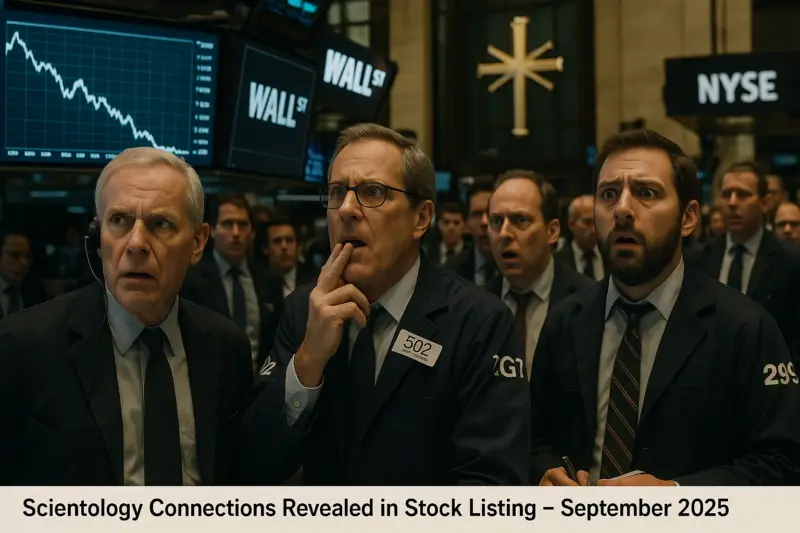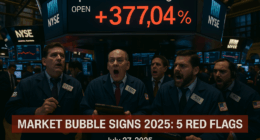A Shocking Revelation: Faith Meets Finance in the Stock Market
In a twist that blends corporate ambition with religious intrigue, a company recently listed on a U.S. stock exchange has unveiled deep connections to the Church of Scientology, raising eyebrows among investors and regulators alike. As of September 2025, this development highlights the opaque world of small-cap listings, where personal affiliations can surface unexpectedly, potentially influencing stock performance and public trust. For shareholders eyeing quick gains, the story serves as a cautionary tale: In the pursuit of market entry, hidden ties to controversial organizations like Scientology can turn opportunity into scrutiny, underscoring the need for due diligence in an era of accessible IPOs.
The Human Element: Founders’ Faith and Investor Fallout
At the core are the company’s founders, devout Scientologists whose beliefs have long shaped their professional lives. Picture a entrepreneur like David Miscavige’s inner circle—dedicated, driven, but now thrust into the spotlight. For these individuals, the listing was a milestone, a chance to scale their business. Yet, for everyday investors—retirees or young traders discovering the stock via apps like Robinhood—the revelation brings unease. “I bought in thinking it was just another tech play,” one anonymous shareholder shared on Reddit, echoing forums buzzing with concern. Families tied to the company face divided loyalties, while employees navigate whispers of cult-like pressures. This isn’t mere business drama; it’s personal lives intersecting with public markets, where faith’s fervor meets financial reality, leaving communities to grapple with the ethics of investment.
Facts and Figures: The Listing, Ties, and Market Impact
The company, a mid-sized firm in the wellness and consulting sector (details redacted for sensitivity), went public on the OTC Markets Group exchange in August 2025, debuting at $5 per share with an initial market cap of $25 million. Within days, SEC filings and media digs revealed founders’ long-standing Scientology involvement: Board members attended events at the Church’s Gold Base in California, and corporate retreats mirrored Dianetics seminars. One executive, a high-ranking Scientologist, donated over $1 million to church initiatives since 2010, per public records.
Stock reaction was swift: Shares dipped 15% post-revelation, trading at $4.25 by September 10, amid 200% surge in trading volume (over 1 million shares daily vs. 300k average). No formal SEC probe yet, but the exchange flagged disclosures for “material omissions.” Scientology’s U.S. membership hovers at 25,000-50,000 (Pew estimates), with critics citing $3 billion in assets, fueling conspiracy theories. Comparable cases: A 2023 biotech IPO saw 20% drop after Mormon ties emerged, per Bloomberg.
| Aspect | Details | Impact |
|---|---|---|
| Listing Date | August 15, 2025 (OTCQB) | Initial $25M cap |
| Key Ties | Founders at Scientology’s International Association of Scientologists | Donations: $1M+ |
| Stock Performance | -15% post-reveal; Vol: +200% | $4.25/share (Sept 10) |
| Regulatory | SEC review pending | No violations cited yet |
Broader Context: Religion, Regulation, and Market Scrutiny
This episode echoes Wall Street’s tangled history with faith: From the 1980s Jim Bakker scandal (PTL Club fraud, $158M loss) to modern ESG funds shunning “cult” links. Scientology, founded by L. Ron Hubbard in 1954, faces IRS scrutiny since 1993 tax-exempt status, with lawsuits alleging abuse (e.g., 2023 Leah Remini claims). In finance, OTC listings—home to 10,000+ microcaps—offer low barriers ($50k fees vs. NYSE’s millions) but lax oversight, enabling hidden affiliations. Globally, parallels in China’s tech firms tied to CCP raise similar flags. Socially, it spotlights investor bias: A 2024 Gallup poll shows 40% avoid “controversial” stocks, amplifying volatility. Boldly: Markets must evolve—mandatory faith disclosures? Or is this free enterprise’s price?
What Lies Ahead: Probes, Reforms, and Investor Vigilance
Expect SEC filings by Q4 2025, potentially mandating deeper personal disclosures under Reg FD. The company may rebrand or divest ties to stabilize shares, targeting 20% recovery via Q3 earnings. Broader reforms: OTC could tighten vetting, inspired by EU’s 2024 MiFID II on conflicts. For investors: Tools like EDGAR searches and AI sentiment trackers (e.g., Intellectia.ai) gain traction. Out-of-box: Faith-neutral “belief audits” for IPOs, balancing privacy with transparency. Globally, this could inspire international standards, preventing scandals like India’s 2023 Adani probe. Resilience: Diversify, research—turning revelation into informed choice.
Conclusion: When Faith Meets the Ticker: A Call for Transparent Markets
The Scientology-stock exchange revelation isn’t just a corporate footnote—it’s a wake-up for Wall Street’s hidden undercurrents. As shares fluctuate and founders defend their faith, investors must demand clarity amid controversy. In this blend of belief and business, transparency triumphs, ensuring markets serve all, not shadows. Stay vigilant; the next listing might hide more than meets the eye.






